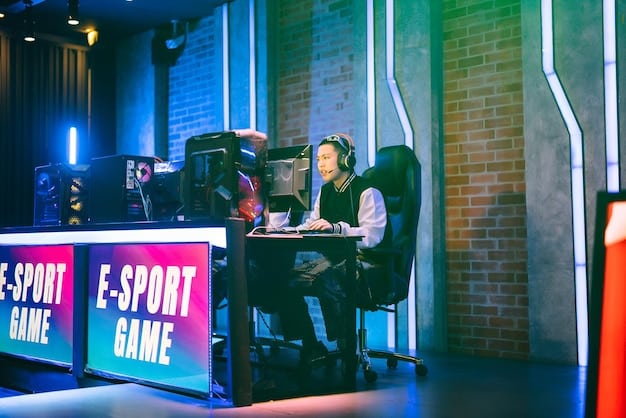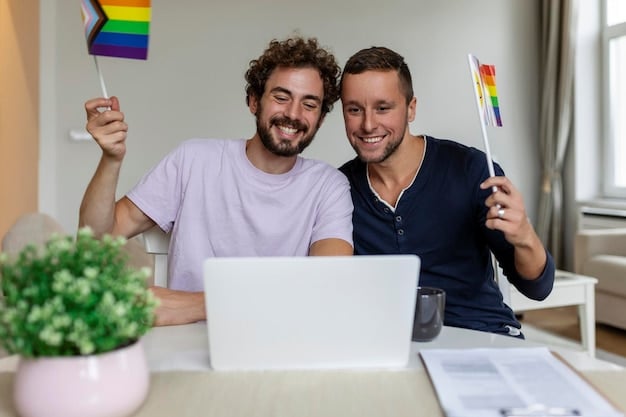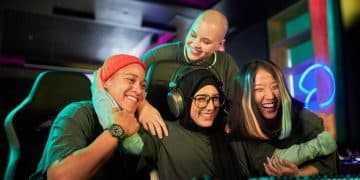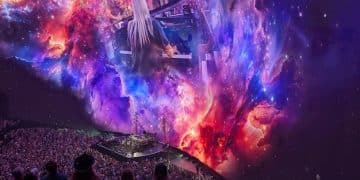LGBT vs. Non-LGBT LoL Esports Teams: Dynamics & Performance

Key differences in team dynamics between LGBT and non-LGBT League of Legends esports teams in the US stem from variations in inclusivity, communication styles, and support systems, which can ultimately affect team cohesion and performance.
Exploring the competitive world of League of Legends (LoL) esports reveals fascinating insights into team dynamics. But what happens when we compare what are the key differences in team dynamics between LGBT and non-LGBT League of Legends esports teams in the US, and how does it affect performance? Let’s dive into the intricacies.
Understanding Team Dynamics in Esports
Team dynamics refer to the interpersonal relationships, communication patterns, and overall interactions within a team that influence how effectively they work together. In the high-pressure environment of esports, understanding these dynamics is crucial for achieving peak performance. Factors like trust, mutual respect, and shared goals are essential for a cohesive and successful team.
Importance of Team Cohesion
Team cohesion is the glue that holds a team together. It encompasses the degree to which team members are attracted to each other, how motivated they are to stay on the team, and how well they coordinate their efforts. A cohesive team is more likely to communicate openly, support each other during stressful situations, and work synergistically towards common objectives.
Communication and Coordination
Effective communication is the backbone of any successful team. In esports, where split-second decisions can make or break a match, clear and concise communication is paramount. Teams must develop strategies for conveying information quickly and accurately, whether it’s coordinating attacks, calling out enemy positions, or adapting to changing game conditions. Miscommunication can lead to costly mistakes and fractured teamwork.

Factors Influencing Team Dynamics:
- Shared vision and goals
- Open and honest communication
- Mutual respect and trust
- Effective conflict resolution
Team dynamics significantly affect a team’s performance in esports by promoting better coordination, decision-making, and overall synergy, which are vital for competitive success.
LGBT Representation in Esports
The presence and visibility of LGBT individuals in esports are growing, yet disparities remain. While representation is improving, LGBT players and personalities often face unique challenges that can impact their experiences and team dynamics.
Current State of LGBT Representation
LGBT representation in esports has seen progress in recent years, with more openly LGBT players and commentators emerging. However, a significant gap remains between representation and equitable treatment, particularly in highly competitive scenes like League of Legends. Visibility is crucial for fostering a more inclusive environment and inspiring others.
Challenges Faced by LGBT Players in Esports
Despite increased visibility, LGBT players still face numerous challenges, including discrimination, harassment, and lack of acceptance within professional gaming communities. These challenges can manifest as microaggressions, blatant prejudice, or exclusion from opportunities, impacting their mental health and performance.
Impact on Mental Health and Performance
The stress of dealing with discrimination and prejudice can take a significant toll on the mental health of LGBT players. Anxiety, depression, and burnout are common issues, which can directly affect their ability to perform under pressure. Creating supportive and inclusive environments is essential for mitigating these negative impacts.
- Homophobia and transphobia within the community
- Lack of inclusive team environments
- Fear of discrimination affecting career opportunities
Encouraging inclusivity and support for LGBT players is essential to fostering healthier team dynamics and improving overall performance in esports.
Comparing LGBT and Non-LGBT Team Dynamics
Team dynamics in LGBT and non-LGBT esports teams can differ significantly based on factors such as inclusivity, communication, and support systems. These differences can influence team cohesion, player satisfaction, and ultimately, team performance.
Inclusivity and Acceptance
LGBT teams often prioritize inclusivity and acceptance, fostering an environment where players feel safe to be themselves. This can lead to better communication, stronger bonds, and increased trust among team members. Non-LGBT teams may vary in their approach to inclusivity, with some actively promoting acceptance and others remaining neutral or unaware.
Communication Styles
Communication styles can also differ between LGBT and non-LGBT teams. LGBT teams may be more open to discussing personal issues or offering emotional support, while non-LGBT teams may focus primarily on gameplay-related communication. The ability to communicate effectively about both strategic and personal matters is crucial for a well-rounded team dynamic.
Support Systems
LGBT teams often have established support systems to help members navigate challenges related to their identity. This may include mentorship programs, community events, or mental health resources. Non-LGBT teams may lack these tailored support systems, potentially leaving LGBT players feeling isolated or unsupported.

Examples of Dynamic Differences:
- Greater emotional support in LGBT teams
- More open discussions about personal experiences
- Stronger emphasis on inclusivity policies and training
Understanding and addressing these differences is essential for creating positive and productive team environments in esports.
Impact on Team Performance
The differences in team dynamics between LGBT and non-LGBT teams can directly impact their performance in League of Legends. Factors such as team cohesion, player satisfaction, and mental health play critical roles in determining competitive success.
Team Cohesion and Synergy
Better team cohesion and synergy are often seen in LGBT teams due to enhanced communication and mutual support. The sense of belonging and acceptance allows players to work together more effectively, resulting in better coordination during matches. This cohesive environment translates to improved strategic execution and adaptability.
Player Satisfaction and Retention
Higher player satisfaction and retention rates are frequently reported in LGBT teams, where players feel valued and understood. This reduces turnover and allows teams to build long-term strategies and relationships. Satisfied players are more likely to invest their time and energy into improving their performance, benefiting the entire team.
Mental Health and Well-being
The improvements in mental health and well-being from supportive team environments can lead to better focus, reduced stress, and enhanced decision-making abilities. This, in turn, positively affects individual and team performance. Players who feel supported are less likely to experience burnout and anxiety, enabling them to perform at their best consistently.
Challenges in proving the impact of LGBT inclusion:
- Limited data comparing team performance
- Difficulty isolating variables affecting success
- Lack of structured research on LGBT team dynamics
Ultimately, a supportive and inclusive team environment enhances team cohesion, player satisfaction, and mental well-being, contributing to improved performance in League of Legends.
Creating Inclusive Esports Environments
Creating inclusive esports environments requires proactive measures to ensure all players, regardless of their sexual orientation or gender identity, feel welcome and supported. Implementing inclusive policies, providing training and education, and fostering a culture of allyship are essential steps.
Implementing Inclusive Policies
Inclusive policies should address issues such as discrimination, harassment, and equal opportunities. These policies should be clearly communicated and consistently enforced. Examples include zero-tolerance policies for homophobic or transphobic behavior and guidelines for inclusive language and representation.
Providing Training and Education
Training and education programs can help raise awareness about LGBT issues and promote understanding and empathy. These programs can educate team members about microaggressions, unconscious biases, and strategies for creating a more inclusive environment. Workshops and seminars are effective ways to deliver this education.
Fostering a Culture of Allyship
Fostering a culture of allyship involves encouraging non-LGBT individuals to actively support and advocate for their LGBT teammates. This can include speaking out against discrimination, using inclusive language, and creating safe spaces. Allyship is a critical component of creating a truly inclusive esports community.
Ways to support inclusivity:
- Establish mentorship programs
- Create safe spaces within team environments
- Promote visibility and representation of LGBT players
By implementing inclusive policies, providing training and education, and fostering a culture of allyship, esports organizations can create environments where everyone feels valued and respected.
Future Directions and Research
Future directions in the study of LGBT inclusion in esports should focus on gathering more data, conducting structured research, and developing best practices for creating inclusive environments. The goal is to gain a deeper understanding of how team dynamics impact performance and to develop strategies for promoting equity and inclusion.
Need for More Data and Research
There is a significant need for more data and research on the experiences of LGBT players in esports. This includes quantitative data on team performance and player satisfaction, as well as qualitative data on the challenges and opportunities they face. More research can also help identify effective strategies for creating inclusive teams.
Developing Best Practices
Developing best practices for creating inclusive esports environments is crucial for ensuring that all players have equal opportunities to succeed. This includes guidelines for inclusive policies, training programs, and support systems. Sharing these best practices throughout the esports community can help create a more equitable and welcoming environment.
The Role of Esports Organizations
Esports organizations play a critical role in promoting LGBT inclusion. By implementing inclusive policies, providing training and education, and fostering a culture of allyship, organizations can create environments where all players feel valued and respected. Organizations should also work to promote visibility and representation of LGBT players.
Focuses for Future Research:
- Longitudinal studies tracking team performance over time
- Comparative analyses of LGBT and non-LGBT teams
- Exploration of the impact of specific inclusive practices
By focusing on data collection, best practices, and the role of esports organizations, the industry can continue to advance LGBT inclusion and create a more equitable and welcoming environment for all players.
| Key Aspect | Brief Description |
|---|---|
| 🤝 Inclusivity | LGBT teams often prioritize creating inclusive and accepting environments. |
| 🗣️ Communication | LGBT teams might have open communication about personal experiences. |
| 🛡️ Support Systems | LGBT teams often provide specialized support systems for their members. |
| 💪 Performance | Inclusive environments can enhance team cohesion and individual player well-being. |
Frequently Asked Questions
▼
LGBT players often face discrimination, harassment, and a lack of inclusive team environments within esports. This can lead to mental health issues and affect their performance.
▼
Teams can implement inclusive policies, provide training on LGBT issues, and foster a culture of allyship. This helps ensure all players feel valued and respected, no matter their sexual orientation.
▼
Effective team dynamics, including communication and trust among members, can significantly enhance a team’s performance in esports by promoting better coordination and decision-making.
▼
Representation is crucial for creating an inclusive environment and inspiring other LGBT individuals in the gaming community. It fosters a sense of belonging and promotes positive change within esports.
▼
Support systems provide mentorship, mental health resources, and community events that help LGBT players navigate challenges. This leads to better mental health, increased satisfaction, and improved performance.
Conclusion
In summary, understanding and addressing the differences in team dynamics between LGBT and non-LGBT League of Legends esports teams in the US is crucial for fostering inclusive environments and improving overall performance. By prioritizing inclusivity, improving communication, and providing support, esports organizations can create teams where all players feel valued and respected.





